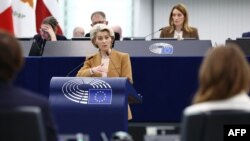The European Union’s executive arm shelved an anti-pesticides proposal Tuesday in yet another concession to farmers after weeks of protests blocked major capitals and economic lifelines across the 27-nation bloc.
Although the proposal had languished in EU institutions for the past two years, the move by European Commission President Ursula von der Leyen was the latest indication that the bloc is willing to let slip some environmental concerns to keep the farming community on its side.
Farmers have insisted that measures like the one on pesticides would only increase the bureaucratic burden and keep them behind laptops instead of on tractors and add to the price gap between their products and cheap imports produced by foreign farmers without similar burdens.
The pesticides “proposal has become a symbol of polarization,” von der Leyen told the European Parliament in Strasbourg, France."To move forward, more dialogue and a different approach is needed.”
She acknowledged that the proposals had been made over the heads of farmers.
“Farmers need a worthwhile business case for nature-enhancing measures. Perhaps we have not made that case convincingly,” von der Leyen said.
It is unclear when new proposals will be drafted. EU parliamentary elections are set for June, and the plight of farmers has become a focal point of campaigning, even pushing climate issues aside over the past weeks.
The decision to shelve the proposal on pesticides represented the EU's latest act of political self-retribution in reaction to protests that affected the daily lives tens of millions of EU citizens and cost businesses tens of millions of euros due to transportation delays.
Last week, von der Leyen announced plans to shield farmers from cheaper products exported from wartime Ukraine and to allow farmers to use some land they had been required to keep fallow for environmental reasons.
The European Commission is set to announce more measures late Tuesday on how to reach its stringent targets to counter climate change. Environmentalists fear their could be more concessions there, too.
In France, where the protests gained critical mass, the government promised more than $436 million in additional financial support.
Meanwhile, protests continued in many EU nations. On Monday night, farmers in the Netherlands blocked several roads and highways with their tractors and torched hay bales and tires.
Police in the rural province of Gelderland said they took action against farmers blocking roads, but there were no immediate reports of arrests.
In recent weeks, farmers have protested from Poland to Greece, and from Ireland over Germany to Lithuania.





